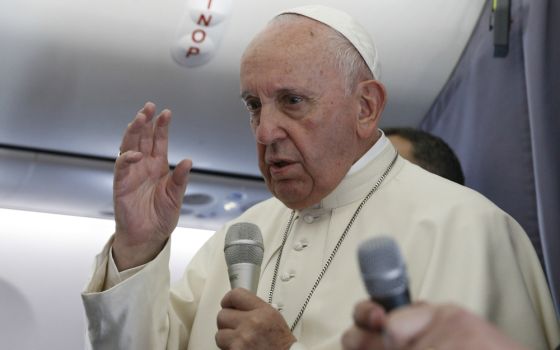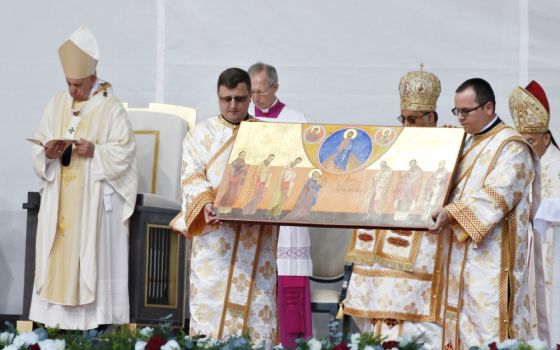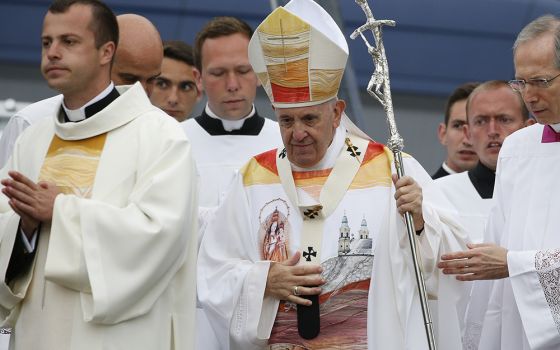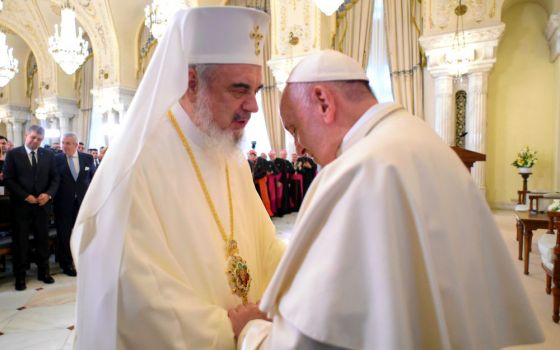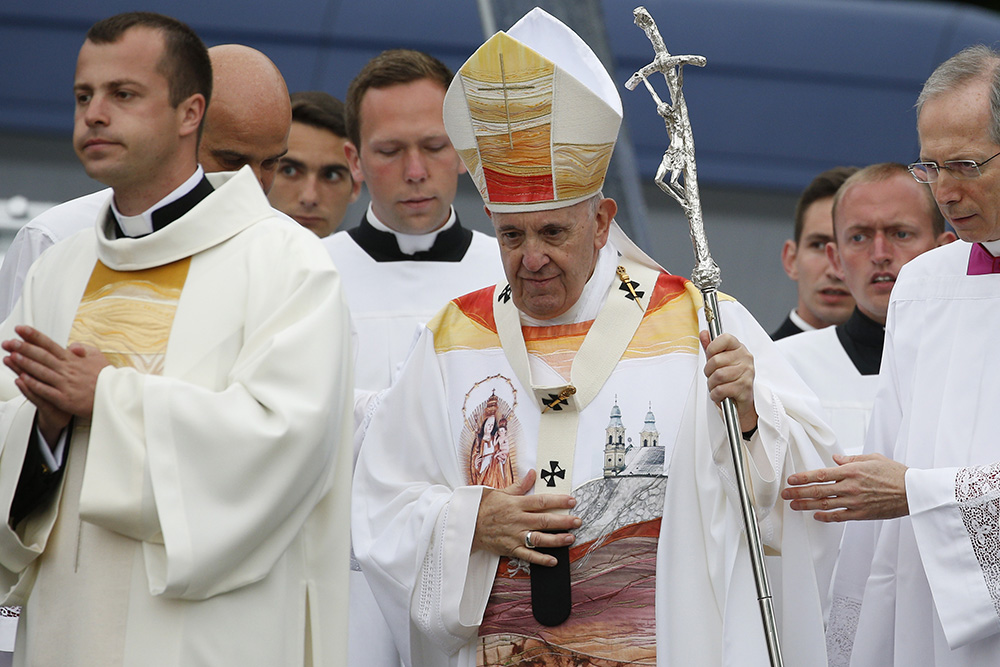
Pope Francis arrives in procession to celebrate Mass at the Marian shrine of Sumuleu Ciuc June 1 in Miercurea Ciuc, Romania. (CNS/Paul Haring)
Tens of thousands of Romanians converged on a mud-strewn hillside to celebrate Mass with Pope Francis June 1, braving heavy rain that forced changes to the itinerary for the pontiff's visit to the picturesque Transylvania region on his second day in the country.
Gathered with umbrellas and ponchos against the backdrop of the densely wooded Carpathian Mountains, the Romanians listened quietly as the pope urged in his homily that they not listen to people wanting to "provoke division" among them, but instead "live together as brothers and sisters."
Francis, who is visiting Romania through June 2, had been scheduled to arrive at the Marian shrine in Miercurea Ciuc by helicopter, but his pilots were unable to fly through the storms.
What was to be a half-hour flight became instead a 2.5-hour road journey through rolling, verdant mountainside, permeated by streams and cottage-style houses. As the weather cleared later, Francis was able to fly via airplane 175 miles north to Iasi, in Romania's Moldavia region.
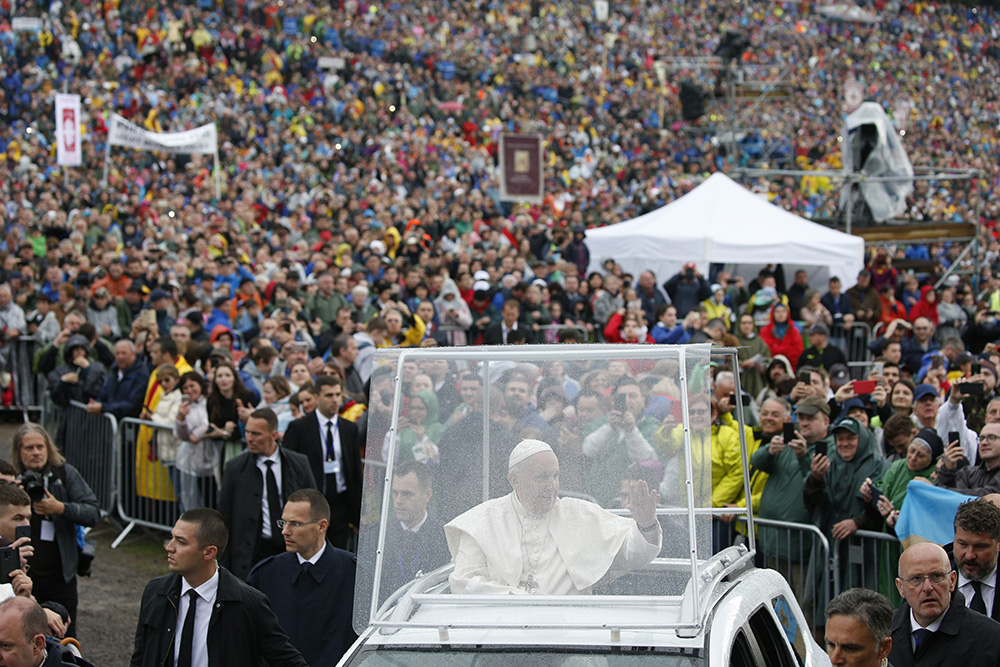
Pope Francis greets the crowd before celebrating Mass at the Marian shrine of Sumuleu Ciuc June 1 in Miercurea Ciuc, Romania. (CNS/Paul Haring)
A nation of about 19 million people, Romania is estimated to be about 86 percent Eastern Orthodox. Francis' focus June 1 was on the country's Catholic minority, which is split between a Latin rite community and the Romanian Greek Catholic Church.
Most of the Latin rite Catholics are centered in Transylvania and Moldavia. Many are also ethnic Hungarians, and the pope appeared to be referencing historic tensions between Romanians and Hungarians in his homily in Miercurea Ciuc.
The pope told the rain-drenched crowds that "complicated and sorrow-filled situations from the past must not be forgotten or denied," but added: "Yet neither must they be an obstacle or an excuse standing in the way of our desire to live together as brothers and sisters."
Transylvania was a part of neighboring Hungary until the end of the First World War, and Hungarians remain the largest ethnic minority in Romania. Hungarian Prime Minister Viktor Orban, who is considered Europe's most autocratic ruler, has visited the region many times, and drew rebuke in 2015 for suggesting it become an autonomous territory.
Hungarian President Janos Ader, who belongs to the same political party as Orban, was among those in the crowd attending Francis' Mass, which organizers said had attracted almost 100,000 people.
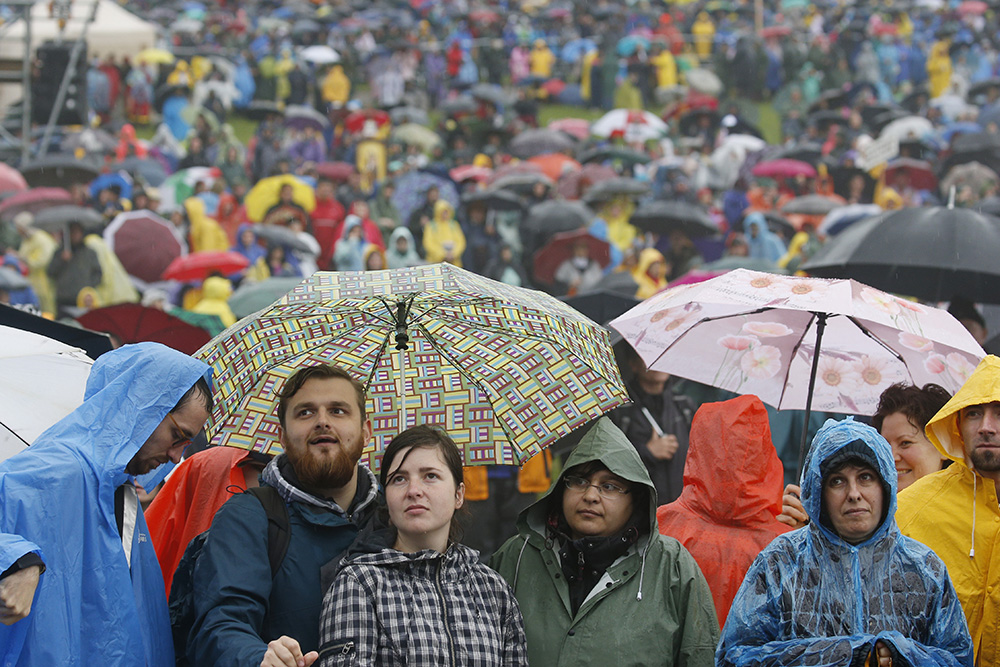
People wait for the start of Pope Francis' celebration of Mass June 1, 2019, at the Marian shrine of Sumuleu Ciuc in Miercurea Ciuc, Romania. (CNS/Paul Haring)
During a meeting with Catholic families and young people later in Iasi, Francis again referred to regional divisions, saying the Devil "divides, scatters, [and] separates" people from one another.
"Each of our lives is anchored in the lives of others," the pontiff told thousands gathered at the city's Palace of Culture, which houses art, history and science museums.
"We belong to each other and our happiness is meant to make others happy," the pope said. "Everything else is nonsense."
Francis is returning later June 1 to Bucharest, Romania's capital, where he is staying throughout his visit.
Upon landing in the country May 31, the pope met with the nation's political leaders as well as Patriarch Daniel, the head of the Romanian Orthodox church.
Advertisement
In a speech to Daniel and members of the permanent Orthodox Synod, the pontiff asked that God would help Catholics and Orthodox experience "unprecedented ways of sharing and of mission."
On June 2, the pope is to return to Transylvania to visit Blaj, the headquarters of the Romanian Greek Catholic Church. While there he will concelebrate an Eastern rite Divine Liturgy for the beatification of seven of the church's 20th century bishops, who were each persecuted by the country's communist-era authorities and died in prison after refusing to renounce their faith.
Francis is the second pope to visit Romania, following John Paul II in 1999. During the two days of his trip, however, John Paul only visited Bucharest.
[Joshua J. McElwee is NCR Vatican correspondent. His email address is jmcelwee@ncronline.org. Follow him on Twitter: @joshjmac.]





